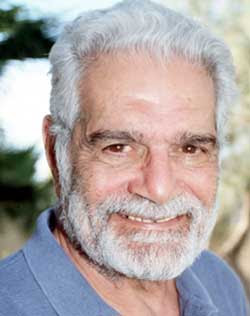Omar Sharif (Arabic:عمر الشريف; born Michael Demitri Shalhoub; April 10, 1932) is an Egyptian actor who has starred in Hollywood films, most famously in Lawrence of Arabia, Doctor Zhivago and Funny Girl. He has been nominated for an Academy Award and has won three Golden Globe Awards.
Omar Sharif was born Michel Dimitri Shalhoub in Alexandria into a wealthy Egyptian Catholic family. Sharif graduated from Alexandria's Victoria College, where he is reported by his schoolmate Edward W. Said to have been sadistic and physically abusive in his capacity as "head boy" at Alexandria's Victoria College. Sharif later graduated from Cairo University with degrees in both mathematics and physics.
In 1953, Sharif began his acting career with a role in Sira` Fi al-Wadi. He quickly rose to stardom, appearing in over 20 Egyptian productions including Ayyamna el helwa with singer Abdel Halim Hafez, La anam in 1958, Sayedat el kasr in 1959 and the Anna Karenina adaptation Nahr el hub in 1961. He also starred with his wife, Egyptian actress Faten Hamama, in several movies as romantic leads.
Sharif's first English language film was in the role of Sherif Ali in David Lean's Lawrence of Arabia in 1962. This performance earned him a Best Supporting Actor Oscar nomination, a Golden Globe Award for Best Supporting Actor - Motion Picture. Following this breakthrough role, Sharif played a variety of characters, including a Spanish priest in Behold a Pale Horse (1964) and the Mongolian conqueror in Ghengis Khan. In 1965, Sharif reunited with Lean to play the title role in Doctor Zhivago, an adaptation of Boris Pasternak's novel. Over the next few years, Sharif starred as a German military officer in The Night of the Generals, as Crown Prince Rudolf of Austria in Mayerling and as Che Guevara in Che!. Sharif was also acclaimed for his portrayal of Nicky Arnstein, husband to Fanny Brice in Funny Girl, though some thought he was miscast as a New York Jewish gambler. His decision to work with co-star Barbra Streisand angered Egypt's government at the time due to Streisand's support for the state of Israel. Streisand herself responded with "You think Cairo was upset? You should've seen the letter I got from my Aunt Rose!" Sharif reprised the role in the film's sequel, Funny Lady in 1975.
In 2003 he received acclaim for his role in the French-language film adaptation of the novel Monsieur Ibrahim et les fleurs du Coran as a Muslim Turkish merchant who becomes a father figure for a Jewish boy.
Sharif once ranked among the world's best known contract bridge players, forming the "Omar Sharif Bridge Circus" in 1967 which toured the world, competing against such powerhouse teams as Blue Team and Dallas Aces, at a time when barnstorming bridge teams were very popular. With Charles Goren, Sharif co-wrote a syndicated newspaper bridge column for the Chicago Tribune for several years, but has mostly turned over the writing of the column to Tannah Hirsch, whose name appears on the byline with Sharif to this day. He is also both author and co-author of several books on bridge and has licensed his name to a bridge computer game; initially released in a DOS version and Amiga version in 1992, Omar Sharif Bridge is still sold in Windows and "mobile platform" versions. For a number of years his partner at international tournaments was Egyptian Contract Bridge Superstar Maged Elewa.
In 2006, Sharif declared both pastimes as ended when he was asked if he still played bridge: "I've stopped altogether. I decided I didn't want to be a slave to any passion any more except for my work. I had too many passions, bridge, horses, gambling. I want to live a different kind of life, be with my family more because I didn't give them enough time."
Sharif is fluent in Arabic, English, Greek, and French. He also speaks some Italian, Spanish and Turkish.
Sharif lived in his native Egypt from birth in 1932 until he moved to Europe in 1965. He recounts that, in 1932, his father "wasn't a wealthy man", but "earned quite a bit of money". Before the Egyptian Revolution of 1952, King Farouk frequented Sharif's family's house, and became a friend and card game partner of Sharif's mother. His mother was an elegant and charming hostess who was all too delighted with the association because it gave her the privilege of "consorting only with the elite" of Egyptian society. Sharif also recounts that his father's timber business was very successful during that time, in ways that Sharif himself describes as dishonest or immoral.
By contrast, after 1952, Sharif states that wealth changed hands (or names) in Egypt, under Nasser's nationalization policies. His father's business "took a beating". Travel restrictions in the form of "exit visas" were required of Egyptians, and his own travel to take part in international films was sometimes impeded, which he could not tolerate. The Nasser government's travel restrictions influenced Omar's decision to remain in Europe between his film shoots, a decision that cost him his marriage to Egyptian film legend Faten Hamama, though they remained friends. It was a major cross-roads in Omar's life and changed him from an established family man to a life-long bachelor living in European hotels. When commenting about his fame and life in Hollywood, Sharif said, "It gave me glory, but it gave me loneliness also. And a lot of missing my own land, my own people and my own country." Due to the state of war between Egypt and Israel, Sharif's Egyptian citizenship was almost withdrawn by the Egyptian Government when his affair with Barbra Streisand was made public in the Egyptian press due to Streisand's vocal support of Israel.








No comments:
Post a Comment